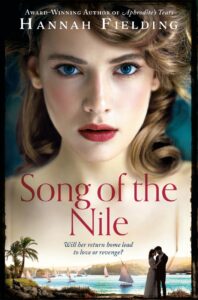Warm up your winter with one of my novels
Warm up your winter with one of my novels
Warm up your winter with one of my novels
-
Hannah
-
Hannah

In my writing, I like to offer readers an opportunity to escape to someplace beautiful, someplace a little exotic, someplace steeped in history and legend and culture, someplace sublimely romantic – and, because it’s so conducive to passion, someplace warm.
I grew up in Egypt, Africa; I have always loved the sun, the heat. After I met my husband in my twenties I settled with him in his home country, England, which is a beautiful place, but goodness did I miss the warmth come wintertime! That is why we have a little house in the South of France, so that I can get my fix of sunshine and that beautiful blue, blue Mediterranean.
Perhaps it is warm where you are; perhaps you are not anticipating a snowy Christmas straight out of a Dickensian scene. But if, like me, you find you are donning thick jumpers and sipping hot tea in an effort to fend off a wintry chill in the air – or, perhaps, you just feel in yourself that you ache for the long, dreamy days of summertime – then I hope I can warm you today with some extracts from my novels.
And if you need a little more light and warmth, a little more escapism and romance, then of course you can purchase any of my novels on this website at https://hannahfielding.net/shop/books/. Glorious sunshine guaranteed!
Burning Embers (set in Africa)
Coral crossed the garden at the back of the house that led down a narrow path to a gate. The three-mile-long beach greeted her in a sweep of dazzling dunes. She loved the freshness of these early morning hours, the unadulterated atmosphere, the daily rebirth of nature.
She walked along the wide, deserted shore, humming, digging her bare feet as deeply as she could into the soft, sugar-white sand, enjoying the warmth that soothed her toes and travelled up her legs, spreading heat through her body. A sense of anticipation, of almost reckless abandon, possessed her, and she ran down the last few slopes that lay between her and the calm aquamarine ocean before immersing herself in the cool, transparent shallows.
She could not have said how long she swam. When she finally emerged from the water, the sun was already high and hot. She stretched herself lazily on her towel and watched the seabirds whirling and squawking in the azure sky. Coral’s eyes closed as an elemental sense of serenity swept over her.
Indiscretion (set in Spain)
Thoughts of the past infiltrated her mind as she picked her way through the cobbled streets lined with tall, whitewashed houses with their protruding casement windows. Bright purple bougainvillea cascaded down walls and honey-scented jasmine spilled out of windowboxes, their aroma mingling with the distinctive salty tang of the sea, invading
Alexandra’s senses. They took her back to a half-forgotten childhood full of sun, earthy smells and music; memories imprinted on her mind and body like a persistent dream.
She found herself following the bank of the peaceful Guadalete. Gangs of naked brown children ran about, laughing and splashing in the shallow, murky waters of the slow-moving, wide river. On the flat swampy bank, flocks of pink flamingos rested languidly in the sun. She walked a long time through the old quarter — the barrio of fishermen and gypsies — lined with wine and tobacco shops, some with whitewashed walls, others painted in bright colours. The sun was scorching and, although hungry, she was reluctant to buy food or refreshments from any of the street sellers.
Soon she came to the harbour. It teemed with a picturesque populace, so very foreign to her but so very intriguing. Men in wide-brimmed hats strolled with women in brightly coloured dresses and mantillas, while old men played draughts at quayside café tables. The clamour of fishermen and fishmongers was everywhere. Sea air mingled with the acrid smell of tar and the reek of fishing nets.
In front of her, the ocean disappeared into infinity. Lines of huts, their mouldy wood gracefully draped with white nets drying in the sun, stretched as far as the eye could see on the shore’s expanse of golden sand. In the far-off backdrop of hills loomed the sombre green shadow of pinewoods and, on the opposite side of the harbour, Cádiz, the bright pearl of the Costa de la Luz, lay shining under a scorching sun.

Aphrodite’s Tears (set on the Greek islands)
The ruined acropolis was sprawled a few metres away under the baking sun. Whoever had been in charge of the excavation here had wrecked the place – that much was clear. There was something sad about the tumbled stones in the bright light of day, she reflected. It had looked much more impressive by moonlight. Damian had explained that the island’s ruins had been picked over long before his family had taken over the place. Oriel sighed. Just think what might have been recovered in the right hands, careful hands like hers.
Part of the ground was covered with a sheath of stiff blue-and-purple spikes, a shrub that looked just like porcupine quills. Here and there, amid the tumbled stones, were bald patches of red clay, streaks of shale and areas of dune. In among the wild barley grass that had grown all over the ruins, the odd architectural gem had endured the hardship of time. As Oriel picked her way carefully around the fallen masonry, she could see tiny mosaic fragments that must once have formed a pavement. These glimpses of the past were tantalizing, yet so frustrating. Now they would never know the designs that had been wrought by the mosaicist. Think, too, what she might have been able to discover about the people who had lived, worked and worshipped here more than two thousand years ago.
Oriel took a sip from her bottle of water. It was amazing how quickly the sun grew in heat. She could see why the inhabitants of the island all those centuries ago believed that Helios, the handsome Titan crowned with the shining aureole of the sun, drove his glittering chariot across the sky each day. Oriel thought it perfectly understandable that they would have personified such a powerful force: after all, they had no scientific explanation for natural phenomena.
She glanced at her watch: ten o’clock. By midday there would be a heat haze over the landscape, scintillating and shimmery, and the sun would be bearing down mercilessly…
Concerto (set in Italy)
Glancing at the clock on her bedside table, she saw that it was almost nine-thirty. She would go for a walk before it got too hot, she decided. It would help clear her head and dispel the recurring, handsome image of Umberto Monteverdi. No need for hasty decisions, she told herself as she scrambled out of bed.
Catriona felt hot and sticky so she quickly showered then went downstairs and into the kitchen for a glass of water. Her breakfast tray was there, laid out with juice, pastries, a bowl of large ripe peaches and a big cafetière of coffee that was still piping hot. … Feeling only marginally hungry, she grabbed one of the pastries to eat while she walked, plus her mobile from the table, and went out into the sunshine.
She sighed with pleasure: she was free. Wandering past the garage and stables, past the meadow where Adelina’s cottage and stone shed nestled next to the tall white asphodels, Catriona moved further south, away from the main villa, and skirted the forest. As she walked, her eyes roamed the ever-changing landscape: cypress trees stood with laurels, and beside them banks of tall mullein stalks with their bright yellow flowers rose into the air. The aroma of camelias, magnolias and rhododendrons mingled with lily of the valley while, bubbling over in an ecstasy of song, the gentle sound of larks floated on the air. Apart from the birdsong and the buzzing of bees, a great hush cloaked the surroundings. It was as if everything in nature was listening, in an expectant mood, and the world was lost for a moment in its own unfolding, dazed by its own happiness, wondering, like her, what this day would bring.

Song of the Nile (set in Egypt)
The early morning train from Luxor to Cairo drew out of the station, jerked, bumped, gathered speed and went racketing along the already hot, shining metal tracks. Though it was only seven o’clock in the morning, the fierce sun poured down on the roofs of the carriages; the air shimmered, silvery, in long waves of heat, and the golden dust of the desert came in through every chink, gritty and stifling.
Crowds of boys and men sat on the roof of the express, and the third-class carriages were packed with people piled in on top of each other with their animals and fowl. Aida sat alone in a large green leather seat in First Class, her window tightly shut, but whereas in other compartments the Venetian shutters were lowered against the sun, hers were pulled up. The false ceiling, with a wide space above it, cut down the sun’s heat, preventing the interior of the carriage from being transformed into a rustic furnace.
Aida could have taken the local Misrair plane that travelled twice a week from Aswan to Cairo, via Luxor and Assiout, which would have reduced the time of the journey to an hour and a half, but she wasn’t in a hurry, and wanted to refamiliarise herself with the colourful Egyptian countryside that she had missed so much during her long years of exile. Along one side of the rails ran a thin canal where women and children squatted in rows, laboriously washing the family clothes; on the other was a dirt road where men on donkey carts laden with newly cut sugarcane or berseem made their way to the fields. …
As the train travelled steadily on, the river flowing gently beside it, smooth as glass, the land gradually presented the verdant richness of arable pasture. Presently, Aida’s attention was drawn to it, finding that it had a life of its own, feasting her eyes on the placid beauty of the picture. Not an inch of the irrigated land was left uncultivated. They passed groves of date palms, young crops of barley, strips of purple flowering fava beans – the staple food of the fellah – and plots of vegetables and cotton. In every field there were fellahin hoeing, scything, harvesting and planting. A white donkey gambolled excitedly as it was let out of its stable into the noonday sun. A lad was plodding along the bank leading a camel, and a couple of small boys in brown-and-white striped pyjamas chatted as they made their way on the dirt road by the side of the river, carrying loaves of baladi bread and some sort of canister that Aida thought most probably contained lunch for their fathers, who had been toiling away in the fields since dawn. Seeing these colourful scenes of the fellahin at work, their heavily laden animals, and the picturesque mud villages, Aida felt that had it not been for the modern jarring element of the train she might have imagined herself back in the time of the Pharaohs.


